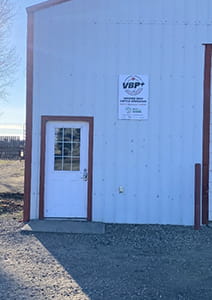By Kaitlyn McMurphy, PAg, Agri-Environmental Specialist, Yorkton
December 2023
In recent years, consumers have expressed interest in purchasing food products labelled as environmentally conscious and responsibly sourced. Saskatchewan’s sustainability story as a major selling point when engaging with trading partners, promoting public trust in the agriculture sector and setting climate mitigation targets. Examples of sustainable practices are those that promote carbon sequestration, responsible nutrient management and minimize greenhouse gas emissions.

proudly displays their Verified Beef
Production Plus sign on the exterior
of their shop.
Sustainable sourcing generally refers to obtaining materials, products and services in a manner that is socially and environmentally responsible. In agriculture, there are typically voluntary and sometimes mandatory requirements set out by third party organizations that are used to achieve a base level production standard and allow claims to be made about a particular product. Sustainable sourcing requirements are typically associated with practices that provide improved environmental benefits while being both economical and socially responsible.
In Saskatchewan, sustainable sourcing verification bodies are sector specific. Below is a brief explanation of some of the sustainable sourcing programs offered.
Crops Sector:
European Union (EU) Sustainability Declaration:
- Canadian canola sold into the European Union (EU) biofuel market is required to meet specific requirements. Administered by Cargill, Viterra and G3, participating producers are required to complete a short questionnaire indicating that the crop was produced in compliance with the EUs requirements. More information can be obtained through the Canola Council of Canada or participating grain handlers.
Fertilizer Canada 4R Designation:
- 4R Nutrient Stewardship (Right Source, at the Right Rate, Right Time, and Right Place ®) is a nutrient management framework developed by Fertilizer Canada that producers can use to demonstrate that crops are produced sustainably. 4R Designation provides recognition for farmers who complete and apply 4R Nutrient Stewardship grower plans and that apply 4R principles. The amount of 4R designated acres in the province is often referred to by federal and provincial governments as a quantifiable climate resilience benchmark. More information can be obtained from Fertilizer Canada.
Livestock Sector:
Canadian Roundtable for Sustainable Beef:
- In the cattle sector, the Canadian Roundtable for Sustainable Beef (CRSB) certification framework is a voluntary framework that cuts across the beef supply chain (producers, processors and sourcing) and outwardly demonstrates that beef is produced responsibly socially, economically and environmentally. CRSB certification ensures sustainable practices are implemented throughout the beef supply chain from the cow/calf operation to the harvest facility and includes third-party audit. Funding incentives available through the Sustainable Canadian Agricultural Partnership for certified operations. More information can be obtained through the CRSB.
- In the dairy sector, proAction is the Dairy Farmers of Canada national quality assurance program that is mandatory on all Canadian farms. Under proAction, farmers demonstrate excellence in six distinct areas: milk quality, food safety, animal care, livestock traceability, biosecurity and environment. ProAction includes training, record-keeping and independent on-farm validations. More information can be obtained through the Dairy Farmers of Canada.
Most sustainably-sourced programs in Saskatchewan are voluntary. Agricultural products verified under these systems may open doors for producers to access broader market prospects and premium pricing of commodities. Although these programs provide additional marketing opportunities, they also satisfy consumer demand for certified sustainably sourced products and aid in building public trust with consumers.
To learn more about Saskatchewan’s sustainability story, visit the Sustainable Saskatchewan website.
